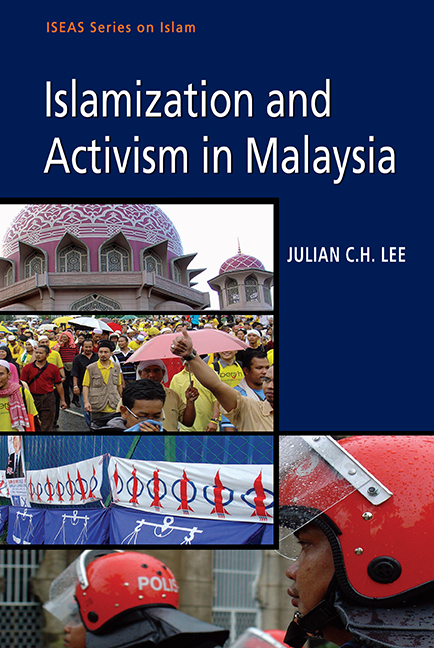Book contents
- Frontmatter
- Dedication
- Contents
- Acknowledgements
- Abbreviations
- Introduction
- 1 On Islam, Democracy, and Activism
- 2 A Short History of Malaysia
- 3 Malaysia as an Islamic State: The Debate
- 4 Conflict of Jurisdiction: Civil versus Syariah Law
- 5 Islamist Lawyers’ Views
- 6 Social Activism and the Article 11 Coalition
- 7 Questioning Orthodoxies, Criticizing Zealotry
- 8 Electoral Engagements
- Conclusion: Islam, Democracy, and Activism in Malaysia
- Bibliography
- Index
- About the Author
- Plate section
Conclusion: Islam, Democracy, and Activism in Malaysia
Published online by Cambridge University Press: 21 October 2015
- Frontmatter
- Dedication
- Contents
- Acknowledgements
- Abbreviations
- Introduction
- 1 On Islam, Democracy, and Activism
- 2 A Short History of Malaysia
- 3 Malaysia as an Islamic State: The Debate
- 4 Conflict of Jurisdiction: Civil versus Syariah Law
- 5 Islamist Lawyers’ Views
- 6 Social Activism and the Article 11 Coalition
- 7 Questioning Orthodoxies, Criticizing Zealotry
- 8 Electoral Engagements
- Conclusion: Islam, Democracy, and Activism in Malaysia
- Bibliography
- Index
- About the Author
- Plate section
Summary
Malaysian Islam made headlines around the world in late 2008 when the National Fatwa Council of Malaysia, which composes fatwas that may be adopted and enforced by individual states, announced first that it was haram (forbidden) for Muslim women to behave like tomboys and, second, that it was against Islam to practise yoga while chanting mantras. While the BBC was able to make light of the “tomboy fatwa”, describing it as a fatwa against women wearing trousers, what is apparent is that there is a willingness on the part of Islamic bodies of the Malaysian State to seek to control the minutiae of people's lives.
Any hopes that Islamization would be halted by what many regarded as an electoral shift away from ethno-religious politics in the 2008 elections are unlikely to remain strong in the face of these fatwas and the other developments. Other examples of deference to conservative Islamic sensibilities include the pop singer Rihanna agreeing in the face of Islamists’ protests in January 2009 to dress more conservatively on stage than she otherwise would have, and the shows of Inul Daratista of Indonesia, who performs a gyrating dance to music known as dangdut, repeatedly being cancelled and rescheduled owing to official protests from Islamists from both PAS and UMNO over the sexual nature of her performances.
The ascent and current place of a general Islamic consciousness in Malaysia is significant and pervasive. A number of Malaysians lamented to me that there was an obsession in Malaysia for every aspect of life to require the stamp of approval from Islamic authorities. One lawyer felt that the silliest and most telling example of this was the trend to find even on bottles of mineral water the symbol for halal (permissible) certification from the Jabatan Kemajuan Islam Malaysia (Department of Islamic Development Malaysia, JAKIM). On another occasion, members of Sisters in Islam have described to me the trend for departments such as the Department for Women, Family and Community Development to send policies to JAKIM for vetting and approval even though there was no need for this to occur and that JAKIM does not request to vet policies. A final example worth noting is that prior to the 2008 elections, the Electoral Commission deemed it necessary to get approval from the National Fatwa Council for the use of indelible ink.
- Type
- Chapter
- Information
- Islamization and Activism in Malaysia , pp. 132 - 136Publisher: ISEAS–Yusof Ishak InstitutePrint publication year: 2010

